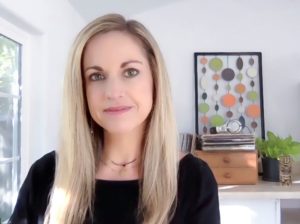Feed Media Group is making it easier for tech companies of all sizes to use licensed music across their services, from fitness and dance apps to mobile games and more.
We recently caught up with COO Lauren Pufpaf to discuss how the company is helping businesses use music to drive revenue and engagement while ensuring rights holders get paid.
What does Feed Media Group do?
Feed Media Group is a B2B music solutions company and what differentiates us most is the combination of pre-cleared music, full set of developer tools, and our world-class curation team. All of the tracking, reporting, and payments are included and we legally indemnify our customers, which relieves all the stress of licensing.

Feed Media Group COO Lauren Pufpaf
Underneath the Feed Media Group umbrella there are two separate product lines. One is Feed.fm, which powers music for lots of big brands and has a strong presence in fit tech, and the other is Adaptr, which we launched this year for up and coming startups and developers. Feed.fm is for non-interactive use cases primarily, whereas Adaptr covers interactive use cases.
We’re just getting off the ground with Adaptr and we’ve got some really compelling products being built. Lots of dance and choreography apps, some fitness, and some pretty innovative mobile games as well.
How does the service differ for each platform?
With Feed.fm we focus heavily on custom curation; trying to build a music experience that is really tightly tailored to the individual app or brand. For fitness what that often means is curating a station that has very tight BPM, very clear intensity ranges, and is stylistically very similar.
In order to create soundtracks that work in a non-interactive framework, we rely heavily on metadata. We’ve built a proprietary backend with custom metadata, but a lot of it comes down to our curation team as well. The human element is really important when you’re catering music for both an exerciser and a brand.
With Adaptr, developers and startups will leverage the catalog and the search capabilities to create custom playlists and stations on their own for their apps. But we are finding that there’s still a need for the curation component as well. We’re actively working with all of our early customers to figure out what the service level needs to be there.
You mentioned your focus on the fit tech space with Feed.fm. What trends are you seeing there?
Over the last 18 months we’ve seen things that were already underway accelerating across the board. In fact, fitness app usage is up almost 60% YoY. Now that gyms have opened back up, we’re seeing the hybrid model emerge. People have invested in equipment and space, and love the convenience of working out at home. But, they also miss the community aspect of gyms and studios.
“Part of the differentiator is how phenomenal of a music experience you can create.”
All of the growth in the sector means there is a lot of competition for members. And part of the differentiator is how phenomenal of a music experience you can create. With increased competition comes increased pressure to build an easy onboarding experience and make sure the first class a user takes is fun, engaging, and has a great soundtrack.
The other piece that everyone’s figuring out in digital fitness is the workflow. Trainers used to create their playlists for the gym on Spotify and play them directly for their members, but that doesn’t work for digital (and wasn’t legal in the gym, but that’s a separate conversation).
We do a lot of education around music licensing and helping our partners find a way to the trifecta: amazing user experience/rightsholders get paid/businesses grow in a sustainable way. Our end game is providing a great user experience and impacting health goals while making sure that the rights holders get paid.
Traditionally the relationship between platforms and music rights holders has been a difficult one to say the least. What are some of the concerns or frictions that you see?
On the rights holder front, their objective of course is creating value for their content. And we know that and support it and are trying to do the same.
I think the challenge is there’s this friction between opening up access/enabling innovation and still having control over every use case. It feels like there’s a great desire to embrace new models and push things forward, but figuring out the economics just takes time.
“I think the challenge is there’s this friction between opening up access/enabling innovation and still having control over every use case.”
Adaptr, in particular, is ultimately set up to be an amazing pipeline for the rights holders. When smaller startups find product market fit and succeed, they will graduate into direct deals and we’re moving them into the ecosystem and connecting them to the rights holders.
I think there’s a really interesting story and long-term narrative around pulling smart technology companies into this ecosystem, making it easy for them to innovate, grow, and then eventually they’ll have the capital to do direct deals as well.
Our VP of music Bryn Boughton is an industry veteran with a ton of great relationships and a clearly defined licensing philosophy. We’re trying to help all three sides land. We want to create a really great experience for the consumer, we want businesses to be successful, and we want rights holders to get paid.
Can you tell us more about the importance of education here?
Yeah. It’s not only small startups, but bigger, sophisticated multinational corporations that don’t understand the value and the cost structure of music. We joke that our head of partnerships and sales is our head of education as well.
We’re spending a lot of time now talking to accelerators and incubators to prep these folks because one of the things that we’re hearing from the investors, particularly in the seed stages, is their startups aren’t allowing enough time to figure out music.
So, we’re working with them to say, look, if you’re considering incorporating music, here are a number of things you need to consider. How much time do you have, how much capital do you have? What’s the use case? Start there and then we can help you figure out what you need.
“It’s not only small startups, but bigger, sophisticated multinational corporations that don’t understand the value and the cost structure of music.”
So far you’ve done deals with the likes of Reservoir, Merlin, and Warner Music. Who’s next on your hit list?
We are definitely interested in having a mix of indie and major music companies. Certainly another major is on the list, coming sooner rather than later.
In general, we feel really good about where the catalog is on Adaptr. As we get more people using the platform, we get more intel around the pockets that aren’t there yet. K-pop for instance is widely requested, so we take that into consideration as we find new partners.
We’re trying to figure out how to support a user experience that feels very fresh. Particularly for the dance and choreography apps, they need big hits, but it’s also about trying to break things and find whatever that next viral track is.
Where are you seeing the biggest challenges and opportunities for Feed Media Group?
A challenge for us on the B2B side is providing our customers a consistent global experience for their members. For a lot of the connected fitness and hardware providers, their next growth inflection point is going to be global. So, helping them to figure out how they can create a consistent experience across their core expansion opportunities is high on our minds right now.
On the fit tech side for Feed.fm, we’re increasingly getting artists, management and other folks looking to leverage the fitness platforms as a new marketing or monetization channel. We’re starting to connect more of our customers with those folks to find ways for them to really leverage the channel.
On the Adaptr side, I think the biggest opportunity is figuring out the fit in terms of catalog and simplicity for those very early-stage users.
Is there anything on the tech horizon that really excites you in terms of how music can be used?
Something that a lot of the fitness brands are working towards that I’m excited about both personally and from a company perspective is really trying to figure out how to be more of a central hub in your health life.
“There’s an opportunity to create ways to plug into your overall health journey and leverage music at all those different points along the way.”
You’ve got the right soundtrack for a workout you’re doing in the morning, later you may leverage a meditation app or use a sleep app at night. There’s an opportunity to create ways to plug into your overall health journey and leverage music at all those different points along the way.
I think that’s really interesting and compelling because the personalization there becomes so important. And that’s a lot of what we’ve been working towards as well.
